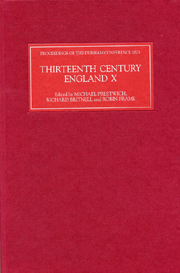Book contents
- Frontmatter
- Contents
- PREFACE
- ABBREVIATIONS
- The Meetings of Kings Henry III and Louis IX
- Counting the Cost: The Financial Implications of the Loss of Normandy
- Networks of Markets and Networks of Patronage in Thirteenth-Century England
- Three Alien Royal Stewards in Thirteenth-Century England: The Careers and Legacy of Mathias Bezill, Imbert Pugeys and Peter de Champvent
- The Eyre de terris datis, 1267–1272
- Joan, Wife of Llywelyn the Great
- Town and Crown: The Kings of England and their City of Dublin
- English Landholding in Ireland
- The Reception of the Matter of Britain in Thirteenth-Century England: A Study of Some Anglo-Norman Manuscripts of Wace's Roman de Brut
- Fearing God, Honouring the King: The Episcopate of Robert de Chaury, Bishop of Carlisle, 1258–1278
- Cloistered Women and Male Authority: Power and Authority in Yorkshire Nunneries in the Later Middle Ages
- Taxation and Settlement in Medieval Devon
- Clipstone Peel: Fortification and Politics from Bannockburn to the Treaty of Leake, 1314–1318
- Royal Patronage and Political Allegiance: The Household Knights of Edward II, 1314–1321
- ‘Edward II’ in Italy: English and Welsh Political Exiles and Fugitives in Continental Europe, 1322–1364
English Landholding in Ireland
Published online by Cambridge University Press: 12 September 2012
- Frontmatter
- Contents
- PREFACE
- ABBREVIATIONS
- The Meetings of Kings Henry III and Louis IX
- Counting the Cost: The Financial Implications of the Loss of Normandy
- Networks of Markets and Networks of Patronage in Thirteenth-Century England
- Three Alien Royal Stewards in Thirteenth-Century England: The Careers and Legacy of Mathias Bezill, Imbert Pugeys and Peter de Champvent
- The Eyre de terris datis, 1267–1272
- Joan, Wife of Llywelyn the Great
- Town and Crown: The Kings of England and their City of Dublin
- English Landholding in Ireland
- The Reception of the Matter of Britain in Thirteenth-Century England: A Study of Some Anglo-Norman Manuscripts of Wace's Roman de Brut
- Fearing God, Honouring the King: The Episcopate of Robert de Chaury, Bishop of Carlisle, 1258–1278
- Cloistered Women and Male Authority: Power and Authority in Yorkshire Nunneries in the Later Middle Ages
- Taxation and Settlement in Medieval Devon
- Clipstone Peel: Fortification and Politics from Bannockburn to the Treaty of Leake, 1314–1318
- Royal Patronage and Political Allegiance: The Household Knights of Edward II, 1314–1321
- ‘Edward II’ in Italy: English and Welsh Political Exiles and Fugitives in Continental Europe, 1322–1364
Summary
The title of this paper derives from an AHRB research project currently under way at the University of Durham. The primary purpose of the project is to establish as complete a record as possible of property-holding in Ireland by those who also held land elsewhere. A relational database (Figure 1) will be used to manage and store this information, and it is planned that this database will be available on-line to allow interested parties to access data relating to particular individuals or particular landholdings in Ireland. Equally important to the project are the questions which will be asked of the data gathered, questions which will be addressed through more traditional means of publication.
As is well known, following Anglo-Norman intervention in Ireland at the behest of the Irish king of Leinster in 1169 and Henry II's decision to take royal ownership of what was becoming a process of conquest in 1171, a web of proprietorship building on existing ‘well-worn lines of contact’ soon linked Ireland to other parts of the British Isles. Important scholarly work examining certain of these landed ties was carried out in the early to mid-twentieth century, the work of Eric St John Brooks on the descent of lands in several families and the descent of the knights' fees of Carlow, Kilkenny and Wexford being particularly significant. More recently, other scholars have studied portions of this web of proprietorship, focusing on particular localities, individual families, or given periods of time. The project aims to add a substantial body of detailed research, on which sound generalisations might be based, to this existing corpus of case-studies.
- Type
- Chapter
- Information
- Thirteenth Century England XProceedings of the Durham Conference, 2003, pp. 119 - 130Publisher: Boydell & BrewerPrint publication year: 2005



